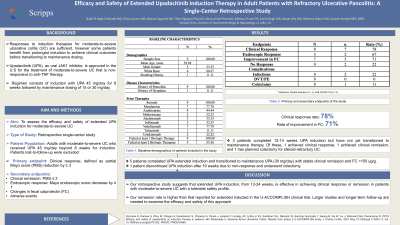Tuesday Poster Session
Category: IBD
P4317 - Efficacy and Safety of Extended Upadacitinib Induction Therapy in Adult Patients With Moderate to Severe Ulcerative Colitis: A Single-Center Retrospective Study
Tuesday, October 29, 2024
10:30 AM - 4:00 PM ET
Location: Exhibit Hall E

Has Audio

Nabil El Hage Chehade, MD
Scripps Clinic
San Diego, CA
Presenting Author(s)
Nabil El Hage Chehade, MD1, Olivia Lanser, MD2, Bonnie Zagorski, RN3, Thien Nguyen, PharmD3, Nirmal Patel, PharmD3, Melissa Ferrari, PA3, Emily Singh, MD4, Mazer Ally, MD3, Rebecca Matro, MD3, Gauree Konijeti, MD, MPH3
1Scripps Clinic, San Diego, CA; 2Scripps Green Hospital, La Jolla, CA; 3Scripps Clinic, La Jolla, CA; 4Scripps Health, San Diego, CA
Introduction: Responses to induction therapies for moderate-to-severe ulcerative colitis (UC) are sufficient, but some patients benefit from prolonged induction to achieve clinical outcomes before transitioning to maintenance dosing. Upadacitinib (UPA), an oral JAK1 inhibitor, is approved in the U.S. for treatment of moderate-to-severe UC non-responsive to anti-TNF therapy. Regimen consists of UPA 45mg/d for 8 weeks induction followed by maintenance 15 or 30 mg/d. We aimed to assess the efficacy and safety of extended UPA induction for moderate-to-severe UC.
Methods: We conducted a retrospective study of adults with moderate-to-severe UC who received UPA 45 mg/d beyond 8 weeks’ induction. Patients without follow-up data after extended induction were excluded. Primary endpoint was clinical response (partial Mayo score (PMS) reduction by ≥ 3). Secondary endpoints included clinical remission (PMS ≤ 2), endoscopic response (Mayo endoscopic score decrease by ≥ 1), changes in fecal calprotectin (FC), and adverse events.
Results: Nine patients were included for analysis. All patients previously failed ≥ 1 biologic therapy, and 5 failed ≥ 2 biologic therapies, of which 1 also failed tofacitinib. Duration of extended UPA induction ranged from 12-24 weeks. Clinical response rate was 78% (7/9) and FC improved in 71% (5/7). At the time of this report, 3 patients completed 12-14 weeks UPA induction but have not yet transitioned to maintenance therapy. Of these, 1 achieved clinical response, 1 achieved clinical remission, and 1 has planned colectomy for steroid-refractory UC. Five patients completed UPA extended induction (range 12-24 weeks) and transitioned to UPA 30 mg/d with stable clinical remission and FC < 150 ug/g. Finally, 1 patient discontinued UPA induction after 16 weeks due to non-response and underwent colectomy. Adverse events included dental abscess (n=1) and mild COVID-19 infection (n=2). No patients developed DVT/PE or MACE.
Discussion: Our retrospective study suggests extended UPA induction, from 12-24 weeks, is effective in achieving clinical response or remission in patients with moderate-to-severe UC with a tolerable safety profile. Our remission rate is higher than that reported for extended induction in the U-ACCOMPLISH clinical trial. Larger studies and longer-term follow-up are needed to examine the efficacy and safety of this approach.
Note: The table for this abstract can be viewed in the ePoster Gallery section of the ACG 2024 ePoster Site or in The American Journal of Gastroenterology's abstract supplement issue, both of which will be available starting October 27, 2024.
Disclosures:
Nabil El Hage Chehade, MD1, Olivia Lanser, MD2, Bonnie Zagorski, RN3, Thien Nguyen, PharmD3, Nirmal Patel, PharmD3, Melissa Ferrari, PA3, Emily Singh, MD4, Mazer Ally, MD3, Rebecca Matro, MD3, Gauree Konijeti, MD, MPH3. P4317 - Efficacy and Safety of Extended Upadacitinib Induction Therapy in Adult Patients With Moderate to Severe Ulcerative Colitis: A Single-Center Retrospective Study, ACG 2024 Annual Scientific Meeting Abstracts. Philadelphia, PA: American College of Gastroenterology.
1Scripps Clinic, San Diego, CA; 2Scripps Green Hospital, La Jolla, CA; 3Scripps Clinic, La Jolla, CA; 4Scripps Health, San Diego, CA
Introduction: Responses to induction therapies for moderate-to-severe ulcerative colitis (UC) are sufficient, but some patients benefit from prolonged induction to achieve clinical outcomes before transitioning to maintenance dosing. Upadacitinib (UPA), an oral JAK1 inhibitor, is approved in the U.S. for treatment of moderate-to-severe UC non-responsive to anti-TNF therapy. Regimen consists of UPA 45mg/d for 8 weeks induction followed by maintenance 15 or 30 mg/d. We aimed to assess the efficacy and safety of extended UPA induction for moderate-to-severe UC.
Methods: We conducted a retrospective study of adults with moderate-to-severe UC who received UPA 45 mg/d beyond 8 weeks’ induction. Patients without follow-up data after extended induction were excluded. Primary endpoint was clinical response (partial Mayo score (PMS) reduction by ≥ 3). Secondary endpoints included clinical remission (PMS ≤ 2), endoscopic response (Mayo endoscopic score decrease by ≥ 1), changes in fecal calprotectin (FC), and adverse events.
Results: Nine patients were included for analysis. All patients previously failed ≥ 1 biologic therapy, and 5 failed ≥ 2 biologic therapies, of which 1 also failed tofacitinib. Duration of extended UPA induction ranged from 12-24 weeks. Clinical response rate was 78% (7/9) and FC improved in 71% (5/7). At the time of this report, 3 patients completed 12-14 weeks UPA induction but have not yet transitioned to maintenance therapy. Of these, 1 achieved clinical response, 1 achieved clinical remission, and 1 has planned colectomy for steroid-refractory UC. Five patients completed UPA extended induction (range 12-24 weeks) and transitioned to UPA 30 mg/d with stable clinical remission and FC < 150 ug/g. Finally, 1 patient discontinued UPA induction after 16 weeks due to non-response and underwent colectomy. Adverse events included dental abscess (n=1) and mild COVID-19 infection (n=2). No patients developed DVT/PE or MACE.
Discussion: Our retrospective study suggests extended UPA induction, from 12-24 weeks, is effective in achieving clinical response or remission in patients with moderate-to-severe UC with a tolerable safety profile. Our remission rate is higher than that reported for extended induction in the U-ACCOMPLISH clinical trial. Larger studies and longer-term follow-up are needed to examine the efficacy and safety of this approach.
Note: The table for this abstract can be viewed in the ePoster Gallery section of the ACG 2024 ePoster Site or in The American Journal of Gastroenterology's abstract supplement issue, both of which will be available starting October 27, 2024.
Disclosures:
Nabil El Hage Chehade indicated no relevant financial relationships.
Olivia Lanser indicated no relevant financial relationships.
Bonnie Zagorski indicated no relevant financial relationships.
Thien Nguyen indicated no relevant financial relationships.
Nirmal Patel indicated no relevant financial relationships.
Melissa Ferrari indicated no relevant financial relationships.
Emily Singh indicated no relevant financial relationships.
Mazer Ally: Abbvie – Speakers Bureau. Lilly – Consultant.
Rebecca Matro indicated no relevant financial relationships.
Gauree Konijeti: Abbvie – Advisory Committee/Board Member, Consultant. Lilly – Consultant, Speakers Bureau. Pfizer – Advisory Committee/Board Member. Takeda – Speakers Bureau.
Nabil El Hage Chehade, MD1, Olivia Lanser, MD2, Bonnie Zagorski, RN3, Thien Nguyen, PharmD3, Nirmal Patel, PharmD3, Melissa Ferrari, PA3, Emily Singh, MD4, Mazer Ally, MD3, Rebecca Matro, MD3, Gauree Konijeti, MD, MPH3. P4317 - Efficacy and Safety of Extended Upadacitinib Induction Therapy in Adult Patients With Moderate to Severe Ulcerative Colitis: A Single-Center Retrospective Study, ACG 2024 Annual Scientific Meeting Abstracts. Philadelphia, PA: American College of Gastroenterology.
